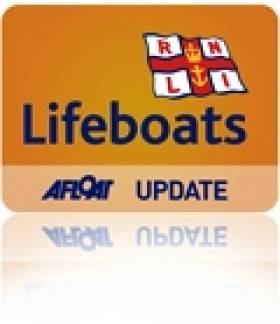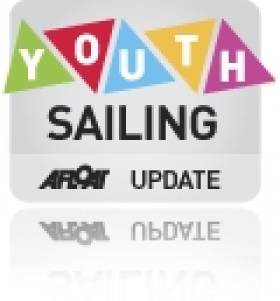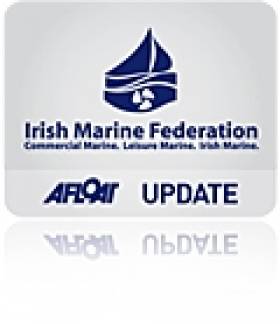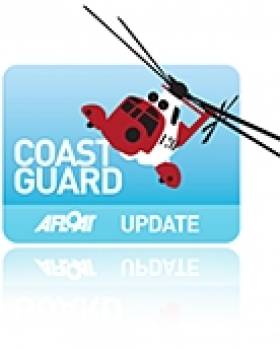Displaying items by tag: Wales
Sheep Rescued by RNLI
A lifeboat crew rescued a sheep and a seal pup in two separate incidents off Anglesey on the far side of the Irish Sea last week.
Moelfre RNLI lifeboat crew helped the sheep after it fell 20ft from cliffs onto an isolated island and became marooned for up to two days near Bull Bay. The full report from the Holyhead Mail is HERE.
Related Safety posts
RNLI Lifeboats in Ireland
Safety News
Rescue News from RNLI Lifeboats in Ireland
Coast Guard News from Ireland
Water Safety News from Ireland
Marine Casualty Investigation Board News
Marine Warnings
Blessington's Finn Lynch Wins British Topper Nationals
From a 15 race series the St. Mary's Carlow school boy took six first places in a fleet of over 300 boats.
The rising star of Irish junior sailing, who is already a world silver medallist in the class, beat Brtiains' Edward Jones by a margin of nine points.
In July, Lynch took control of the Irish Championships in July to count nothing but podium finishes on his way to the national title against a fleet of 66 in Carlingford.
Earlier this year Lynch also cleared up at the ISA Youth Nationals winning seven out of eleven races in Schull.
Topper Results here.
Ireland's First Irish Sea Marine Leisure Conference Planned
The Irish Marine Federation in its role as lead partner in the Interreg Programme, irish-sea.org, is currently working on the following projects. Executive Steve Conlon gives the following update to afloat.ie:
Marine Leisure Conference:
A conference to assist marine leisure companies to survive the current downturn on both sides of the Irish Sea is currently being planned. A number of high level speakers will be engaged to give advice on how to survive the recession and to bring forward development ideas to assist growth once the economies on both sides of the Irish Sea recover. The exact details of the speakers and the content is still being developed so if you have any suggestions for speakers or subjects to be covered please contact Steve Conlon. We intend this to be a seminal event of major importance to the industry so to ensure the maximum value can be gained for our members your input into the content and the context will be invaluable.
Coastal Communities:
The establishment of a number of Coastal Communities around our coasts to boast the marine leisure industry and to ensure that maximum number of marine leisure companies can benefit from the Interreg Programme. Two new coastal Communities about to get underway, Tralee Bay and Waterford/East Cork.
National Maritime Spatial Plan:
The Coastal Communities will also ensure that marine leisure becomes fully integrated into the national Maritime Spatial Plan when it is developed through contributing to a coastal audit of all marine leisure activities. Through our partners in South Wales, The Pembrokeshire Coastal Forum will assist us to produce an Integrated Coast Zone Policy for marine Leisure. This will be delivered through a number of workshops around the coast.
Marine Festivals and Events:
We have published the Social Economic Study into the value of the Volvo Dun Laoghaire Regatta: Copies of the study are available from Steve Conlon. The study provides an insight into the spend per boat, the tourism aspects of the event and also the visitor spend. Dun Laoghaire Rathdown County Council is using some of the data collected for another project that they are conducting into the development of a new brand image for the Town of Dun Laoghaire. The total value of the regatta is put at €2.4 million.
Irish-sea.org is also conducting a similar study for the Town of Wicklow who held a Sailfest in conjunction with the Conway Round Ireland Race. This study is still being compiled and the results will be published later in the Autumn. The Interreg Programme worked with both Wicklow Sailing Club and the local Wicklow Chamber of Commerce on the event and the study. Approx 10,000 people visited the town during the 3 days of the festival.
The Fenit based Coastal Community held a successful Seabreeze Festival as part of the Round Ireland Powerboat race. The Interreg Programme assisted the Community with several aspects of the event.
Business Training:
Several marine leisure businesses have benefited from the business training that is available through the County Enterprise Boards. If you wish to be involved in this activity please contact Steve Conlon.
Marina Management Training:
Irish-sea.org has been working with the British Marine Federation/Yacht Harbours Association to bring a number of courses to Ireland. We had hoped to run an "Intermediate Marina Managers" course in Ireland this year but this has now been but back until the spring of next year. The BMF will run a full Certified Marina Managers Course in Ireland in the Autumn. If there are any members who have the pre-qualifications for this course please contact Steve Conlon as the programme would like to assist as many of those who do qualify to participate. The BMF have chosen Ireland as the location to run this international course in competition with a number of other locations. Ireland came out tops in every respect from the well run marina facilities that they visited, travel access and transfer, conference and hotel facilities. Ireland as a venue came out tops in almost every criterion tested so from a marine leisure tourism perspective the holding of this prestigious course in Ireland may help put us on the map.
Contact: [email protected]
Welsh Weather Washes out Powerboat Grand Prix
Appalling weather conditions washed out Saturday's racing at the Pwllheli Grand Prix of the Sea.
Consistent rain and strong winds kept the powerboats moored in the marina as the teams remained indoors to keep themselves dry and mull over tactics for Sunday's high octane action.
Whilst most of the UK was basking in glorious summer sunshine, a small pocket of miserable weather in north Wales conspired to foil the P1 SuperStock teams, who were left feeling frustrated ahead of round three of this year's championship.
Rhys Evans of 300 Class outfit Evans Heritage Developments rued their poor luck after a period of continuous beautiful British weather. He said: "It's hugely frustrating. After checking and rechecking everything on the boat, including exhausting every possible error, as well as our onboard communications, we are left twiddling our thumbs wanting to get out on the water."
For the 300 Class teams there is added caution using this year's new Mercury 300 XS engines. Evans added: "Every race you want to put 'peddle to the mettle' but if conditions are as rough as this, you always reservations about how hard you want push it.
"We are still learning about the performance and durability of the engine, so in violent conditions you want to be cautious. It's just part and parcel of motorsport racing."
Unlike in popular four-wheeled motorsports a powerboat race track is ever-changing and places the emphasis on the expertise of the pilots. Whether or not powerboats race in flat or bumpy conditions, Evans believes it is still a matter of personal preference. "Driver's can use different tactics but it all comes down to working the wheel and keeping the boat as level as possible.
"Instead of looking 100 metres ahead the pilots have to look even further in choppy waters. Keeping the prop in the water and maintaining a decent speed are the priority for every team but inevitably there is an element of uncertainty when you take off from a wave and hope to get a smooth landing."
Racing will now start at 10:00 on Sunday 11 July with each class racing twice.
'Captain Calamity' Rescued Twice in Two Days
A lone sailor in the Irish Sea who was rescued south of Mumbles yesterday with no power and almost no safety equipment on board has just been rescued again after setting out for the second time and once again losing engine power, this time off Rhoose Point.
At quarter past eight yesterday the male on board the yacht 'Stravaig' contacted Swansea Coastguard to inform them that he had lost all electrical power and was drifting nine miles south of Mumbles Head. The man had no navigation lights, and only a mobile phone with a very low battery as a communications device. The only navigational equipment he had was a handheld GPS which also was very low on battery.
The Mumbles RNLI lifeboat was launched to the 12 metre yacht and towed her in to Mumbles. A second lifeboat also assisted with her mooring.
Almost exactly 24 hours later, at ten past eight this evening, Swansea Coastguard received another call from the same yacht, reporting that it had again run out of power. This time the Barry Dock lifeboat has been sent to tow the vessel back in to Barry. Barry Coastguard Rescue Team will meet the vessel in order to give the sailor advice on how to safely continue his journey.
Dave Jones, Swansea Coastguard Watch Manager said:
"When we give out safety advice to people going out for a trip in a yacht we recommend that people take adequate communications and navigational devices, flares, and check their engines. Unfortunately, this man followed none of this advice and set out not once, but twice, knowing that he did not have sufficient power to reach his destination.
All of the rescue resources tasked to this man's two rescues have been volunteers and we hope that the yachtsman will consider full equipping and preparing his vessel before continue his journey in order that we do not have to send them out to his rescue for a third time."
New Sponsor for Welsh Shows
Zodiac Marine & Pool, manufacturer of the Avon, Zodiac and Bombard brands of RIB's and Inflatable boats, has today confirmed sponsorship of both the South Wales and North Wales Boat Shows for 2010. ZMP will be represented by dealers at both shows with Glaslyn Marine present at the South Wales Boat Show which will take place at SA1 Swansea from Friday 18th - Sunday 20th June, and Cambrian Boats exhibiting at the North Wales Boat Show, taking place from Friday 30th of July - Sunday 1st August at The Vaynol Estate, Bangor.
The announcement means visitors to the show will be given the chance to see a full range of ZMP products through its exclusive Welsh dealerships. This will include the industry leading Avon Seasport Jet performance tenders and the superb value Bombard inflatable tenders.
"We are very pleased to confirm that ZMP is the first company to sponsor both the North Wales and South Wales Boat Shows. ZMP will be given prime show areas at both of the shows as part of the sponsorship, giving the dealers the very best location to display this range of exceptional boats," explains Ben Sutcliffe of the show organizers.
Commenting on the announcement, Alan Morgan, Director of ZMP Recreational UK, said "We have closely followed the development of both the North Wales and South Wales Boat Shows with interest throughout the year. Our dealers have come away from previous shows with very positive results and we are therefore delighted to be returning in 2010 with even greater support. The fact that our UK offices are based in Wales makes sponsorship of both shows even more fitting."
For further information on other exhibitors and events taking place at both the shows, please visit www.northwalesboatshow.co.uk for the North Wales Boat Show, and www.southwalesboatshow.co.uk for the South Wales Boat Show.





























































